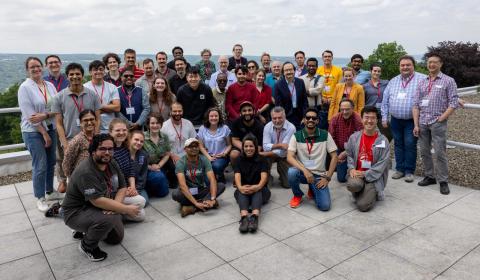Over several months, the X-CITE team developed comprehensive training materials aimed at equipping researchers with essential computing and programming skills, from data collection, data processing, and running simulations, to storing and publishing data — essential skills not only for successful beamtime at CHESS but also for a wide range of scientific experiments beyond the synchrotron.
The X-CITE initiative is a three-year project with a broad and comprehensive curriculum, meeting the evolving needs of CHESS users. Collaborating institutions on X-CITE include: Cornell University, University of North Carolina at Chapel Hill, and the University of Southern California.
The aim of the day-long workshop was to address the computing needs of CHESS users — from data collection during beamtime through subsequent data analysis — by leveraging the knowledge, experience, and research expertise of the X-CITE team. Contributing members Anirban Mandal (UNC), Erik Scott(UNC), Sajith Sasidharan (UNC), Karan Vahi (USC) brought expertise in distributed systems, scientific computing, and scientific workflows, while Kelly Nygren (CHESS) and Werner Sun (CLASSE) imparted their institutional know-how to provide a complete and thorough overview of CHESS computing.
Key topics included the basics of the CHESS research workflow, data collection software, the Linux operating system, and Python programming. Participants also received an overview of the cyberinfrastructure resources available at CHESS and beyond.
A hands-on tutorial allowed users to practice running data analysis jobs at CHESS, and a demonstration from Valerio Pascucci and Giorgio Scorzelli (University of Utah) of data visualization dashboards from the National Science Data Fabric added an extra layer of practical learning.
“We aim to provide enough information so users can ask the right questions and are able to discover more details on their own,” says Werner Sun, CLASSE IT Director and a local workshop organizer for X-CITE. “While these trainings may only scratch the surface of scientific computing, the goal is to empower researchers to enrich their beamtime at CHESS and other lightsources.“
As CHESS annually welcomes approximately 1,000 users from around the globe, these researchers do not always have the opportunity to engage with their fellow CHESS colleagues. A highlight for many of the workshop attendees was the opportunity to meet and share their diverse experiences with computing—both at CHESS and within their home institutions. One particularly engaging session was the town hall discussion, which fostered interactions and the exchange of ideas among participants and organizers. These interactions underscored the collaborative spirit that the X-CITE program aims to cultivate within CHESS and beyond.
Looking Ahead: Future Plans for X-CITE
Building on the foundation laid by this year's workshop, the team will develop new training modules and refine existing materials over the next year. Preparations for the next X-CITE workshop, slated for June 2025, are already underway, with organizers keen to incorporate new ideas and feedback from this year's event.
READ MORE:
The X-CITE program is funded by the U.S. National Science Foundation (NSF).
